

Serving Those Who Have Served: Veterans in First-Year Seminar Emily Edwards, First-Year Seminar Director, University Studies Glenn Puffer, Associate Dean of Students, Veterans Seminar Instructor
Outline • Background • Differences & Obstacles • Tactics and Curriculum • Findings to Date • Q & A
Montana State University Campus Location: • Bozeman, Montana Fall 09 Demographics: • 12,764 Total Students 2,316 First-Years • • 356 Veterans
2009 Fall First-Year Students • 88 % Identified as White, Non-Hispanic • 62% Montana Residents • 58% Male • 19 - Average Age • 73% Enrolled in a Seminar
First-Year Seminars at MSU • Required of All Students • Fulfills Core Requirement • Offered by 6 Departments “Introduction to college studies aimed at expanding students’ intellectual interests, improving critical thinking and communication skills, and creating a community of learners” (Core 2.0)
US 101 First-Year Seminar University Studies 101 First-Year Seminar 50 Sections serve 850 students annually Specialized Sections : • Veterans • Native American Students • Non-Traditional Students
Veterans Concerns • Relating to Civilians • Finances • PTSD, TBI • Fear of Deployment or Redeployment • Course Transferability • Adapting to Academic Rigor • Sensitivity to Military Stereotype
College Student Inventory* • Conducted CSI During Orientations • Both Veterans and Civilians Used Form B Findings reveal notable differences in areas surrounding academic motivation , general coping skills, and receptivity to assistance * Noel-Levitz, Inc .
College Student Inventory Findings VETERANS: CIVILIANS: Study Habits 57.0 Study Habits 45.1 Intellectual Interests 61.0 Intellectual Interests 54.6 Career Closure 58.4 Career Closure 46.5 Desire to Finish College 49.0 Desire to Finish College 42.4 Academic Assistance 58.8 Academic Assistance 47.5 Career Counseling 36.8 Career Counseling 43.9 Social Enrichment 27.0 Social Enrichment 42.8
Obstacles & Concerns Establishing the Veterans Seminar • Lack of Diversity • Funding Undersubscribed Section • Adequate Instructional Expertise • Peer Leader Selection • Control of Tailored Curriculum • Assurance of Academic Rigor
Solutions • University Studies sponsored test section • Veterans Services shared funding • Faculty (Retired Army LTC) instructor • Student veteran as peer leader* • Teach curriculum “as is” for test * Hazardous
Snapshot of Veterans Section • Four offerings of Vets Section (2006-2009) • 54 students enrolled (41 Veterans) • 27 Deployments amongst 41 Veterans • Average Age: 24.6 • Veterans: 41 male, 13 female • Non-Veterans: 5 male, 9 female
OBSERVATIONS OVER FOUR SEMESTERS
Veterans Who Choose Vets Section • Seek to learn/socialize with other Vets • Feel alienated from “civilian” undergrads • Look for support from those “in the know” • Want to strengthen academic skills • More comfortable with environment
Environment Veterans section encourages greater class participation, exchange of ideas, and candid communication among peers. Free to challenge ideas without repercussion, and share common professional experience. Familiar military team relationship - “Camaraderie”
What Do You Want? When Do You Want It? • Veterans expect clear, concise instructions and well-defined expectations. • Veterans are by training results/outcomes oriented. They value immediate feedback.
Typical Assignments Individual Group • Lead Discussion • Team Building • Readings • Debates • Assigned Papers • Open Seminar • Quotes • External Events • Haiku
Mixed Feedback on Curriculum • As a group, vocal on current events • Vets want subjects that they can relate to – Readings geared toward Vets vs. Civilians • Does not mean they want to read about military subjects or current wars
Persistence • 100% of Fall 2009 Veterans returned for Spring 2010 • 75% of Fall 2008 Veterans are still enrolled • Considering Academic Years 2006, 2007: – 62% of Vets enrolled in the Vets Seminar are still enrolled – 50% of Vets not enrolled in the Vets Seminar are still enrolled * Office of Planning and Analysis
Course Evaluation Feedback • Keep this course at all costs. “Don’t give up the hill.” • I enjoyed some reads over others, but I found I learned something from each of them. • This class was a great opportunity to have a veterans only section. I know that other veterans I have talked to will want to enroll in this course. • Sentence structure workshop early in term. Too much writing . • I enjoyed the vets section of the class. I had people I could relate to and it made discussion easier.
Questions?
Thanks to Our Colleagues • Brenda York, Veteran Services • Erika Swanson, First-Year Initiative Office • Chris Fastnow, Office of Planning and Analysis • Jim Vernon, Media Services • Nora Smith, Former Director of US 101
Thank You! Emily Edwards, First-Year Seminar Director, University Studies eedwards@montana.edu 406.994.3517 Glenn Puffer, Associate Dean of Students, Veterans Seminar Instructor gpuffer@montana.edu 406.994.2826
Recommend
More recommend